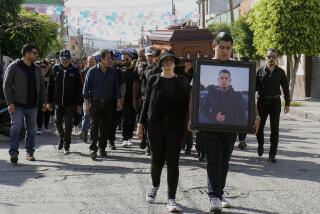‘Ninja’ Slayings Terrorize Indonesians
JAKARTA, Indonesia — The killing of black-magic sorcerers began in September, carried out by masked assassins dressed in black. Some victims were decapitated, others disemboweled.
The assassins--called “ninjas” after the Japanese warriors of bygone days--worked silently, disappearing back into the night as quickly as they had come. In addition to those believed capable of supernatural hexing and healing, the victims have included Muslim clerics and ordinary farmers.
So far, 182 people on Java--the island on which the Indonesian capital, Jakarta, is located--have died in the mysterious bloodletting.
In the city of Banyuwangi alone, the toll has reached 110. Jakarta has been spared, but in targeted areas Javanese have responded with hysteria, barring the doors and windows of their homes and forming vigilante groups to patrol the empty streets.
Black magic has long been part of Javanese life in this predominantly Muslim country. Former President Suharto, deposed during May riots after 32 years in power, was such a believer in the supernatural that many of his decisions were based on the advice of astrologers.
However, the recent rash of killings--and the inability of security forces to prevent it--is particularly unsettling because it underscores the general breakdown of law and order throughout Indonesia. It represents another challenge to the authority of President B.J. Habibie’s fragile government.
An official team investigating the slayings told parliament last week that it has verified 182 deaths this year through Oct. 17 but has not discovered who is behind the slaughter. The team reported, however, that it is fairly certain the killings are organized.
Western diplomats and opposition leaders say there are indications that the violence may be orchestrated by rogue army officers in order to weaken Habibie, discredit his defense chief, Gen. Wiranto, and torpedo attempts to lessen the military’s role by convincing reformers that there is too much lawlessness now.
Military dissidents, a government investigation recently concluded, helped incite rioters during Jakarta’s May civil violence that claimed 1,200 lives. They also are widely believed to have been provocateurs last month when student protests turned violent and Muslims attacked Christians in Jakarta. Sixteen people died in the November unrest.
Whoever is behind the black-magic killings, it is clear the ninjas are not freelance gangsters. They are well-organized and efficient--sometimes cutting electricity to an entire village before carrying out their quick executions.
Some rural Javanese have already adopted a policy of vigilante justice. In the last two months, residents armed with knives, clubs and spears have killed at least 45 people they suspected of being ninjas. Some were burned alive, others lynched. The head of one suspect was paraded through a village, held aloft on a pole.
“The ninja is dead!” chanted a motorcyclist as he sped through another eastern Java town, dragging the naked, headless corpse of a suspected ninja.
“We cannot let these kinds of circumstances continue,” Maj. Gen. Nurfaizi, the central Java police chief, told reporters. But he admitted that his forces have had little success preventing such vigilante actions.
One final irony in Java’s season of killing, police officials say, is that most of the suspected ninja victims are not sorcerers at all. They are mentally ill people identified as sorcerers because of their disoriented behavior.
More to Read
Sign up for Essential California
The most important California stories and recommendations in your inbox every morning.
You may occasionally receive promotional content from the Los Angeles Times.










